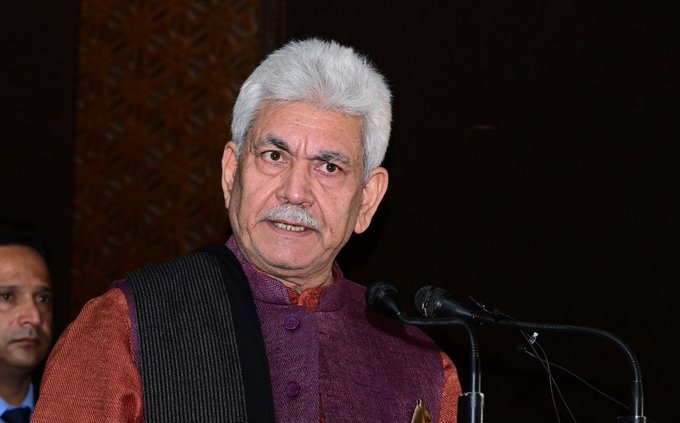Srinagar: With a new Bill to be moved in Parliament for amending the law, the Lieutenant Governor of Jammu and Kashmir is poised to get powers to nominate three persons, including a woman, to represent Kashmiri migrants.
As per Lok Sabha’s revised list of business, Union Home Minister Amit Shah will introduce a Bill to amend the Jammu and Kashmir (Reorganisation) Act, 2019 to create three nomination seats in the in J&K Assembly.
While two nomination berths in the Union Territory’s Legislative Assembly would go to the population displaced due to insurgency after 1989, one berth is being reserved for representation of the people who migrated to Jammu and Kashmir from the Pakistan-occupied territories of the erstwhile State in and after 1947.
In the erstwhile State’s Legislative Assembly, elections used to be held for 87 seats. The Governor has powers to nominate two women to ensure better representation to the fair sex. In the new UT Assembly, LG would now have powers to nominate two persons, including a female, from the Kashmiri migrants while he would nominate one person to give representation to the PoK refugees.
It is not immediately clear whether these nominated MLAs would have the right to vote in all legislations and formation of the Government or their mandate would be limited like the two nominated MLAs of the erstwhile State Assembly.
The Union Government is introducing four Bills related to Jammu and Kashmir in the current monsoon session of the Parliament.
Shah will also introduce a Bill to amend the Jammu and Kashmir Reservation Act, 2004, which is a State law. It is being amended in Parliament to change the nomenclature of ‘Other Social Castes’ category to ‘Other Backward Classes’ as also to incorporate some more castes. Sources said that 24 seats (in addition to 90 elected and 3 nominated MLAs) would continue to remain reserved for representation of the people of PoK and the same would be filled by election as and when those occupied territories would come under the control and administration of the Union of India.
According to the schedule, Union Tribal Affairs Arjun Munda will introduce a Bill to amend the Constitution (Jammu and Kashmir) Scheduled Tribes Order, 1989. The Constitution (Jammu & Kashmir) Scheduled Tribes Order (Amendment) Bill, 2023, seeks the inclusion of the Paharis, Paddaris, Gadda Bramans, and Koli tribes into the ST category.
Union Minister for Social Justice Dr. Virendra Kumar will introduce The Constitution (Jammu and Kashmir) Scheduled Castes Order (Amendment) Bill, 2023, which seeks inclusion of the Valmiki community in the list of Scheduled Castes of Jammu and Kashmir.
With the decks being cleared for granting ST status to the Paharis but the Gujjars nursing fears of sharing their reserved quota with the Paharis, two separate delegations of the two communities called on Union Home Minister Amit Shah in New Delhi on Tuesday. Both the delegations comprised BJP leaders from J&K.
J&K’s Lieutenant Governor Manoj Sinha and BJP’s National General Secretary incharge Jammu and Kashmir, Tarun Chug, were also present in the meetings chaired by the Home Minister.
Sources said that Shah assured the delegations that the current 10 percent reservation for STs in government jobs and scholarships would remain intact without regard to inclusion of Paharis. He assured the delegations that Oahari Qabila and others would get separate reservations and both would be treated as Scheduled Tribe (ST).
Shah urged his guests to maintain brotherhood, harmony and work together for taking Jammu and Kashmir ahead in all spheres. The delegations, according to sources, have been assured that Gujjars, Bakerwals, Gaddis, Sippis, Sheenas and all those who are already entitled to reservation under ST category, would continue to get 10 percent reservation in educational institutions, government jobs etc.
Pahari Qabila, Paddari tribe, Gadda tribal Brahmans and Koli tribal community would get separate reservations, the percentage of which would be decided by both the Centre and the UT Governments in consultations with each other. However, all of them would be treated as STs which would make them eligible for political reservation in the Panchayats, Assembly and Parliament. Even at the national level, all such groups would fall in the ST category.
Now, as per the insiders, besides Gujjars and Bakerwals, Gaddis, Sippis and Sheenas; Pahari Kabila, Paddari tribe, Gadda Brahman tribe and Koli tribal community would be entitled to 10 percent political reservation under ST category right from Panchayat to Assembly and Parliament. In the UT’s Assembly, comprising 90 seats (47 from Kashmir and 43 from Jammu), 9 seats (10 percent) have been reserved for STs for the first time. Seven seats will continue to remain reserved for Scheduled Castes.
Regarding percentage of reservation in educational institutions and jobs for Pahari Qabila, Paddari tribe, Gadda Brahmans and Koli, the insiders said it is likely to be reflected in the Bill to be introduced in the Parliament.
Prior to their meetings with the Home Minister, the Paharis and Gujjars and Bakerwals met Lieutenant Governor Manoj Sinha separately in New Delhi and discussed the issue of reservation in detail. Both sides briefed Sinha on their issues and expectations from Centre as well as UT Governments.
The delegation of Paharis, comprising 23 persons from across J&K, was jointly led by the former Deputy Chief Minister Muzaffar Hussain Baig and former MLC Vibodh Gupta. The 21-member delegation of Gujjars and Bakerwals included several former Ministers and former legislators besides some District Development Council members.




















